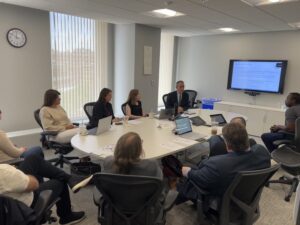Who is a member?
Our members are the local governments of Massachusetts and their elected and appointed leadership.

Enrique Zuniga, executive director of the state’s Peace Officer Standards and Training Commission (back corner, by the window), gives an update on POST’s work during the June 23 meeting of the MMA Policy Committee on Personnel and Labor Relations. The MMA’s five policy committees are seeking new members for 2024.
Local officials are invited to fill a limited number of positions available on the MMA’s five policy committees for 2024.
More than 100 local officials from communities across Massachusetts serve on MMA policy committees, which advise the MMA Board of Directors, MMA staff and MMA members on legislative, regulatory and public policy issues.
• Online application form
• Deadline: Jan. 25
The committees also draft resolutions for the MMA’s Annual Business Meeting, municipal best practices for the MMA’s Best Practices series, and bills (biannually) for the MMA’s legislative package.
Each committee has a regular schedule of meetings, usually one per month. Additionally, committee members may be asked to read legislative summaries, bill text, and/or position papers to prepare for meetings.
Each committee is assigned an MMA staff member to assist with its research, consideration of issues, and administrative functions.
Each committee has 23 members, including mayors, select board members, councillors, city and town managers/administrators, and finance committee members, plus four presidential appointees and four technical appointees.
The MMA president names the chair and members of the committee, subject to approval by the MMA Board of Directors.
Those with the interest and time to serve on a policy committee are asked to fill out the application form on the MMA website by Jan. 25. The form provides space to list areas of interest and expertise so that a good match can be made between volunteers and the work of the committees.
About the policy committees
• Fiscal Policy Committee: This committee considers all municipal finance issues. Legislation that has a fiscal impact is referred to this committee from other committees as well. This committee also develops a policy framework for local government financing in the future.
• Policy Committee on Energy and the Environment: This committee formulates policy in the following areas: water quality, water supply, air quality, solid waste and recycling, hazardous waste, wetlands, coastal areas, wastewater treatment, renewable energy and energy conservation.
• Policy Committee on Municipal and Regional Administration: This committee considers issues that relate to the organization, structure, efficiency, and productivity of local and regional government and the relationships between the two levels of government. Issues include housing and zoning, procurement, economic development, regulation of marijuana, open meeting law and public records law, public health and safety, and licensing.
• Policy Committee on Personnel and Labor Relations: This committee considers issues in the following areas: collective bargaining, civil service, employee benefits and pension reform.
• Policy Committee on Public Works, Transportation and Public Utilities: This committee considers issues that relate to regional and metropolitan transportation, transportation planning, the relationship between local governments and the Massachusetts Department of Transportation, and the question of local control in joint state-local public works programs.
The MMA is the one voice that advocates for direct aid and support for core municipal and public education services provided by every community in Massachusetts. The MMA’s advocacy efforts are focused on a single goal: Building strong communities in Massachusetts.
For more information, contact Daniel Yi at dyi@mma.org or or visit www.mma.org/advocacy.